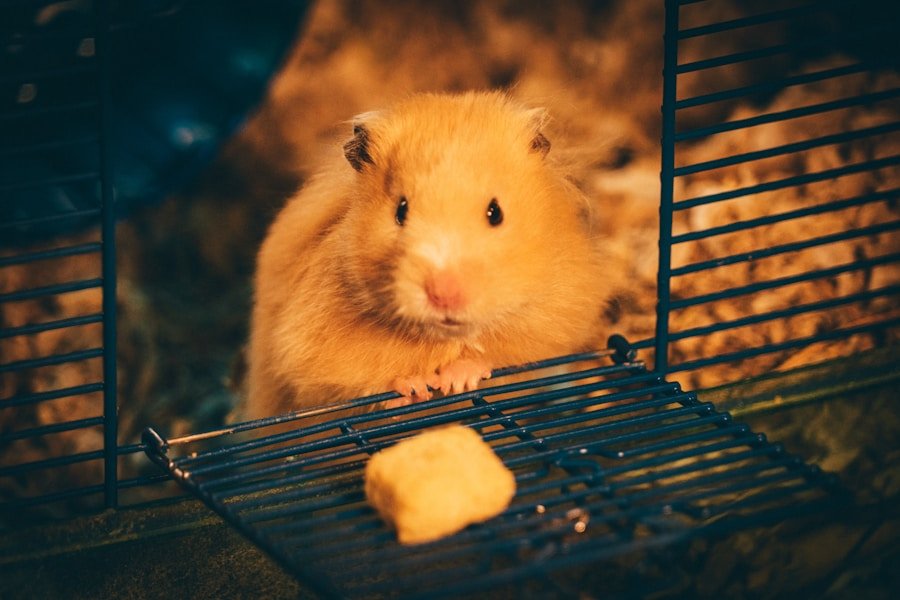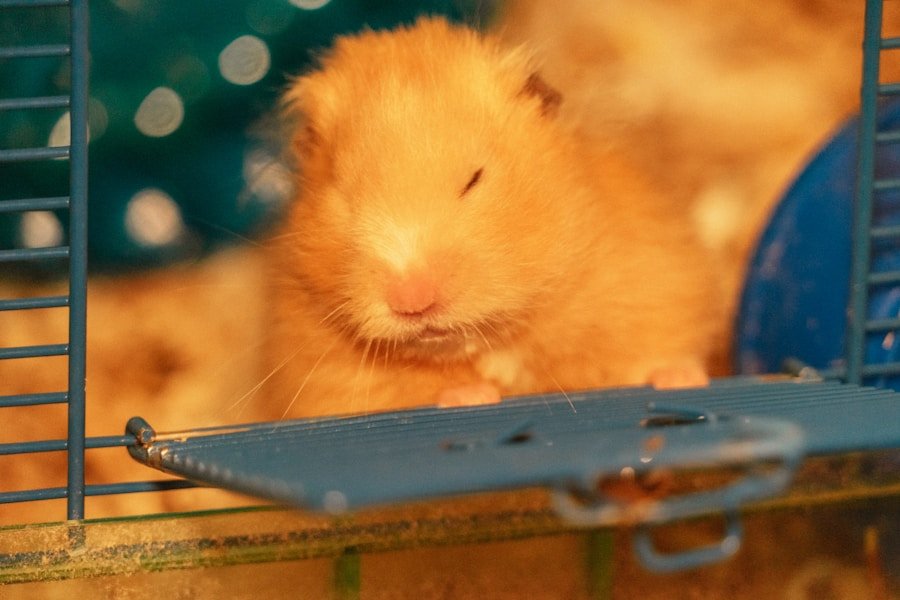Table of Contents
Honey Bear Hamsters, also known as the Syrian Hamster, are one of the most beloved pet choices for small animal enthusiasts. Their charming personalities and adorable appearance make them a favorite among families and individuals alike. Originating from the arid regions of Syria, these hamsters were first discovered in the 1930s and have since become a staple in households around the world.
Their gentle nature and relatively easy care requirements make them an ideal pet for both novice and experienced owners. These hamsters are particularly known for their fluffy coats, which can come in various colors, including golden, black, and cream. Their round faces and tiny paws add to their cuteness, making them irresistible to many.
Honey Bear Hamsters are nocturnal creatures, meaning they are most active during the night, which can be a delightful experience for owners who enjoy watching their pets play and explore during the evening hours. As we delve deeper into the needs and care of Honey Bear Hamsters, it becomes clear why they are such a popular choice for pet lovers. About Pawwise is a website where you can find helpful information about pet care and training.
Key Takeaways
- Honey bear hamsters are a popular small pet known for their friendly and social nature.
- Understanding the needs of honey bear hamsters includes providing a proper diet, suitable living space, and regular exercise and enrichment.
- Creating the perfect living space for your honey bear hamster involves providing a spacious cage with bedding, hiding spots, and toys for mental stimulation.
- Feeding and nutrition for honey bear hamsters should include a balanced diet of hamster pellets, fresh fruits and vegetables, and occasional treats.
- Exercise and enrichment for honey bear hamsters is essential for their physical and mental well-being, including providing a wheel for running and various toys for play.
Understanding the Needs of Honey Bear Hamsters
Solitary Animals
hamsters are solitary animals, preferring to live alone rather than in pairs or groups. This solitary lifestyle means that they require a space where they can feel safe and secure without the stress of competition for resources.
A Comfortable Environment
Providing them with a comfortable environment is crucial for their well-being. In addition to their need for solitude, Honey Bear Hamsters require mental stimulation and physical activity to stay healthy.
Meeting Their Needs
They are naturally curious creatures that enjoy exploring their surroundings. Therefore, it is important to provide them with toys and activities that can keep them engaged. Understanding these needs will help you create an environment that promotes their happiness and health.
Creating the Perfect Living Space for Your Honey Bear Hamster

Creating an ideal living space for your Honey Bear Hamster is essential for their comfort and well-being. A spacious cage is a must; a minimum of 24 inches long by 12 inches wide is recommended. The cage should have solid flooring rather than wire mesh to prevent injuries to their delicate feet.
Additionally, it should be well-ventilated and escape-proof, as these little adventurers are known for their ability to squeeze through small openings. Bedding is another important consideration when setting up your hamster’s home. Opt for soft, absorbent bedding made from paper or aspen shavings, avoiding cedar or pine shavings due to their harmful oils.
Providing hiding spots, such as tunnels or small houses, will give your hamster a sense of security and a place to retreat when they feel overwhelmed. Adding a wheel for exercise is also crucial; ensure it is appropriately sized for your hamster to prevent back injuries.
Feeding and Nutrition for Honey Bear Hamsters
| Feeding and Nutrition for Honey Bear Hamsters | |
|---|---|
| Food Type | Pellets, seeds, nuts, fruits, and vegetables |
| Protein Content | 16-20% |
| Fat Content | 4-7% |
| Fiber Content | 6-10% |
| Recommended Daily Amount | 1-2 tablespoons of food per day |
| Water | Always have fresh water available |
Feeding your Honey Bear Hamster a balanced diet is vital for their health and longevity. A high-quality commercial hamster food should form the basis of their diet, providing essential nutrients and vitamins. Look for pellets that contain a mix of grains, seeds, and vegetables to ensure a well-rounded diet.
Fresh fruits and vegetables can be offered in moderation as treats, but be cautious with sugary options like bananas or grapes. Water is equally important; ensure your hamster has access to fresh water at all times. A water bottle with a sipper tube is often preferred over a bowl, as it helps keep the bedding dry and prevents spills.
Be mindful of portion sizes; overfeeding can lead to obesity, which is a common issue among pet hamsters. Regularly monitor your hamster’s weight and adjust their diet accordingly to maintain a healthy body condition.
Exercise and Enrichment for Honey Bear Hamsters
Exercise is crucial for Honey Bear Hamsters to maintain their physical health and mental well-being. These energetic little creatures need plenty of opportunities to run, climb, and explore. A sturdy exercise wheel is an excellent addition to their cage, providing them with an outlet for their natural instincts to run.
In addition to a wheel, providing various toys and enrichment activities can keep your hamster entertained. Chew toys made from safe materials help keep their teeth healthy while also providing mental stimulation.
Consider creating an obstacle course or hiding treats around their cage to encourage exploration and play. Regular out-of-cage time in a safe, supervised area can also provide additional exercise opportunities while allowing you to bond with your furry friend.
Grooming and Hygiene for Honey Bear Hamsters

Grooming your Honey Bear Hamster is an essential part of their care routine, especially if you have a long-haired variety. Regular brushing helps prevent matting and keeps their coat clean and healthy. Use a soft-bristled brush designed for small animals to gently groom your hamster without causing discomfort.
Bathing is generally not necessary; hamsters are good at grooming themselves, but if they get into something sticky or dirty, a gentle wipe with a damp cloth can suffice. Maintaining hygiene in your hamster’s living space is equally important. Spot clean the cage daily by removing soiled bedding and uneaten food to prevent odors and bacteria buildup.
A full cage clean should be done weekly, replacing all bedding and cleaning the cage with mild soap and water. Rinse thoroughly to ensure no soap residue remains before reintroducing your hamster to its home.
Health and Wellness for Honey Bear Hamsters
Keeping your Honey Bear Hamster healthy involves regular monitoring of their behavior and physical condition. Common health issues include wet tail, respiratory infections, and dental problems. Wet tail is particularly concerning; it manifests as diarrhea and can be life-threatening if not treated promptly.
If you notice any signs of illness—such as lethargy, loss of appetite, or unusual behavior—consult a veterinarian experienced with small animals immediately. Preventative care is key to maintaining your hamster’s health. Regular check-ups with a vet can help catch potential issues early on.
Additionally, providing a balanced diet, clean living conditions, and opportunities for exercise will contribute significantly to your hamster’s overall wellness. Keeping an eye on their weight and ensuring they remain active will help prevent obesity-related health problems.
The Benefits of Owning a Honey Bear Hamster in a Small Space
Owning a Honey Bear Hamster can be incredibly rewarding, especially for those living in smaller spaces such as apartments or condos. These charming little creatures require relatively minimal space compared to larger pets while still offering companionship and joy. Their playful antics can bring smiles to your face after a long day, making them perfect companions for singles or families alike.
Moreover, Honey Bear Hamsters are low-maintenance pets that do not require extensive grooming or daily walks like dogs do. Their nocturnal nature means they can fit into various lifestyles without demanding attention during the day when many people are busy with work or other commitments. With proper care and attention, these delightful hamsters can thrive in small living spaces while providing endless entertainment and affection to their owners.
These colorful and intelligent birds are sure to capture your attention with their playful personalities and impressive vocal abilities. Check out this article to discover more about these amazing feathered friends.
FAQs
What is a Honey Bear Hamster?
A Honey Bear Hamster is a type of hamster that is known for its golden or honey-colored fur and its friendly and social nature.
What is the average size of a Honey Bear Hamster?
Honey Bear Hamsters are typically larger than other hamster breeds, with an average size of 6-7 inches in length.
What do Honey Bear Hamsters eat?
Honey Bear Hamsters are omnivores and their diet consists of a variety of foods including hamster pellets, fresh fruits and vegetables, and occasional treats such as nuts and seeds.
What type of habitat do Honey Bear Hamsters need?
Honey Bear Hamsters require a spacious cage with plenty of bedding for burrowing, as well as a wheel for exercise, hiding spots, and chew toys to keep their teeth healthy.
Are Honey Bear Hamsters good pets for children?
Honey Bear Hamsters can make great pets for children, as they are generally friendly and easy to handle. However, adult supervision is always recommended when children are interacting with any pet.


